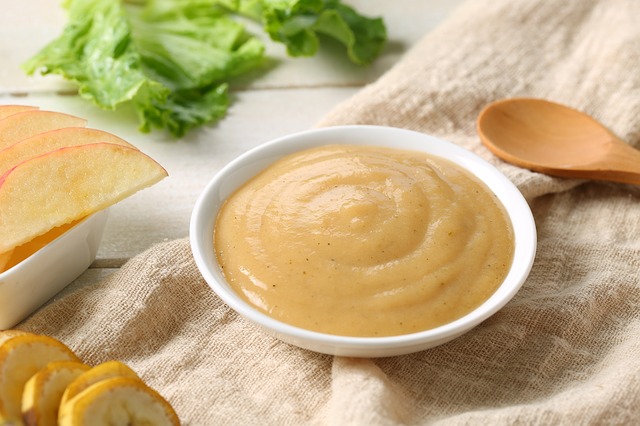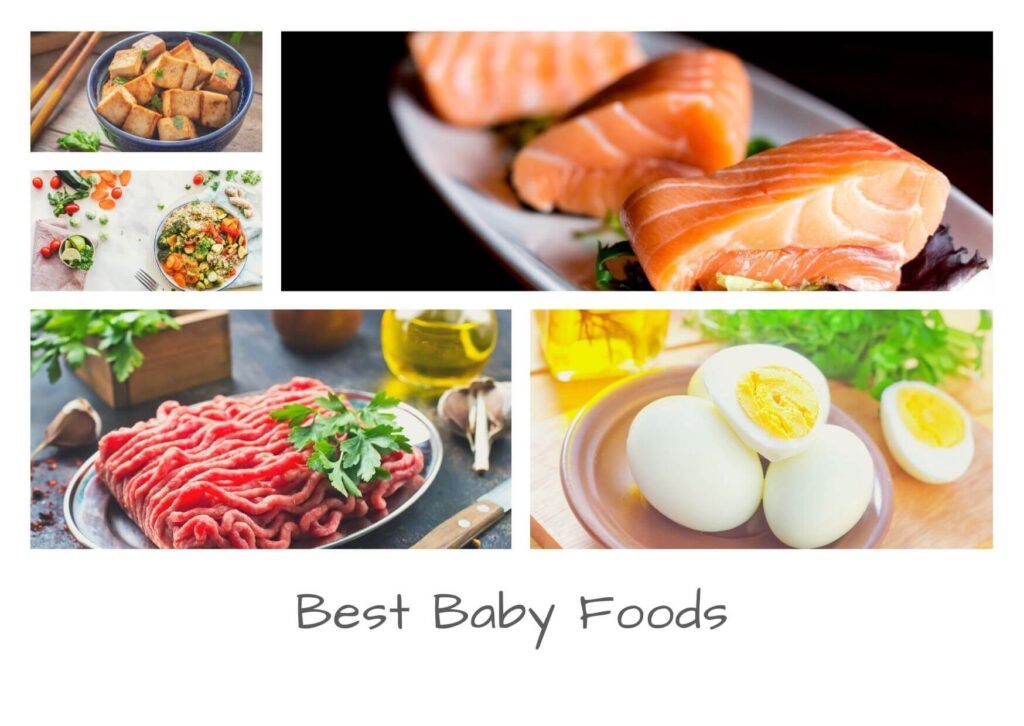Have you seen these cute videos of kids cringing when given lemons for the first time? How beautifully they shake in disbelief and look at their parents, who in turn just laugh heartily? Although you may not try giving this acidic food until later, it’s finally time to buy utensils because your baby is about to start eating solids. However, the question then becomes, “what first foods should I introduce first, especially if this is your first baby?”
Table of Contents
What Foods Should I Introduce to My Baby First?
According to the American Academy of Pediatrics, you don’t need to give your baby food in a specific order. It’s not rocket science, simply pick the food you are comfortable with and get started. Pediatricians, however, recommend starting with something pureed such as meat, beans, poultry, and iron-fortified foods.
Most parents seem to agree since we all naturally gravitate towards infant cereals. But giving rice cereals alone is not enough, so be sure to offer a variety of fortified cereals as well. You see, rice cereal is said to cause constipation in babies when they start solids.
For this reason, opt for fortified cereals like oats, multi-grain, and barley as they are whole foods and more nutritious and also help avoid constipation.
So, what foods should you introduce first?
- Iron-fortified cereals
- Poultry
- Fish
- Minced meat
- Mashed or cooked egg
- Legumes
- Cooked tofu
- Vegetable – cooked potato, carrots, and green veggies like baby spinach and broccoli
- Fruits like apple, peach, pear, avocado, melon, plum
- Grains such as oats, pasta, rice, and bread
- Dairy foods like yogurt with active culture and aged cheese
How Do You Introduce Food for the First Time?
Your baby is just getting started with solids, so take it slow. Let your little one try one flavor or texture at a time as opposed to bombarding them with several foods at the same time.
Once you introduce a certain food, let your child eat it for about three days before you introduce something else, so they get used to it. This method has three advantages.
● Knowing your baby’s allergies – You easily know the foods your little one is allergic to since you have a few days to observe their reaction to the foods.
● Prevent constipation – In case your baby becomes constipated, which may happen once they start solids, you will know which foods are the culprit. But, just because your little one gets constipation does not mean you should stop feeding them this type of food. Instead, you should learn how to avoid constipation and what to do to relieve your little one.
● Learn your baby’s interest – You learn which foods your baby loves and what’s a no-go zone. Like you, your baby will love certain foods and hate others.

First Foods for Your Child Dos and Don’t
Although there is no formula on how you should introduce a baby’s first foods, you should keep in mind these few do’s and don’ts, so you start healthy feeding habits early. Obviously, you don’t want your little one to hate certain food or overfeed.
The Dos of Baby First Foods
1. Visit your pediatrician
Your pediatrician knows your baby pretty well, so it helps if they do a quick check-up to make sure your little one is ready for solids.
2. Follow your little one’s cues
When babies are ready for their first food, they naturally give tons of cues. For instance, you will notice your little one is interested in the food you are eating, and they may even try to grab it. You will also notice that they open their mouth when you offer them food on a spoon. Sometimes, you will see them opening their mouths when you are eating.
You’ll also know your baby is ready when they can hold toys with their cute little hands and when they bring everything to their mouth. They can also sit upright without support and will try to grab things that interest them. Don’t rely on the body cues alone because babies develop differently.
3. Start slow
Think of this as a marathon rather than a sprint. Since your baby is still drinking their fair share of breastmilk or formula, start with a spoonful or two of one food type at a time. At this stage, you want your child to get used to the act of eating while experiencing different tastes and textures.
Feed them once they’ve had their milk or formula, and gradually reduce the amount of milk or formula they take before meals while increasing their food portions. Eventually, you can give your little one milk or formula once they have eaten and reduce the amount gradually until it’s completely replaced with food.
By the time your child is about 9 months, and you should have worked your way up to three full meals with snacks in between.
4. Experiment with flavors and textures
As mentioned earlier, introduce different foods and textures after every three or four days. You can also add some natural spices and herbs to offer your baby different flavors.
5. Feed your child when they get slightly hungry
Have you ever seen an extremely hungry baby? They are grumpy and angry, which makes it difficult to introduce new foods. If your baby is full, they won’t be interested in the food you try to give them, no matter how well made and tasty it is. To strike a balance, feed your baby when they are slightly hungry since they are more receptive.
6. Let your baby play with their food
No, I don’t mean give them a full bowl and let them make a mess, and they will make a mess; you can be sure of that. I mean, put a little on the feeding tray and let your baby try it before you start feeding them. Think about it. If everything your baby touches somehow ends up in their mouth, where is the food you place on their tray likely to go? In their mouth!
Also, mealtimes should be a happy time, so don’t worry about the mess your baby makes. Playing with the food helps your baby deal with it on their own.
7. Keep introducing rejected food
Just because your baby rejected broccoli the first time they tried it doesn’t mean they won’t change their mind, so don’t give up yet. Introduce the rejected food again after a couple of weeks and see how your baby reacts to it.
8. Keep milk or formula in the meal plan
Babies still need their milk or formula, so they get the nutrition needed. Before nine months, your baby should drink at least 800ml of milk or formula a day every 3 to 4 hours. Between 9 and 12 months, they should drink around 700ml between 4 to 5 hours. Taking milk or formula also gives them some comfort since this has been their only meal for six months.

Baby First Food: The Dont’s
1. Don’t be forceful
Being forceful puts pressure on your baby and takes away the fun of eating. If they reject a certain type of food, set it aside and try it another time when they are more receptive to trying something new. You can even give it a week or two before trying again.
2. Don’t offer vegetables before fruits
Some people argue that giving your baby fruits before veggies make them develop a sweet tooth and reject vegetables. Others say that introducing fruits first encourages your baby to look forward to mealtime. However, there is no evidence supporting any of these analogies. In fact, there is no formula on what to introduce first between the two, so go with your gut.
3. Don’t avoid meat
Babies who eat meat get the iron they need into their diet earlier than those who don’t. This mineral is essential for your baby’s health, so whip out that blender and puree some fish, meat, or chicken.
Which Foods Should You Avoid Giving an Infant Before 12 Months?
While babies can eat almost anything during this stage, there are a few foods you should avoid. They include:
● Salt – Your babies digestive system can’t process salt yet
● Raw eggs – Contain Salmonella bacteria which causes salmonella
● Sugar – Can lead to tooth decay and obesity
● Honey – It contains bacteria that can cause infant botulism
● Coffee and Tea – Contain caffeine
● Soft drinks – Are acidic and can cause tooth decay or too sugary and will cause excess weight gain
● Nuts – Are hazardous due to allergies. Be careful when giving peanut butter to your kid and rush them to the hospital if you notice any allergic reactions.



